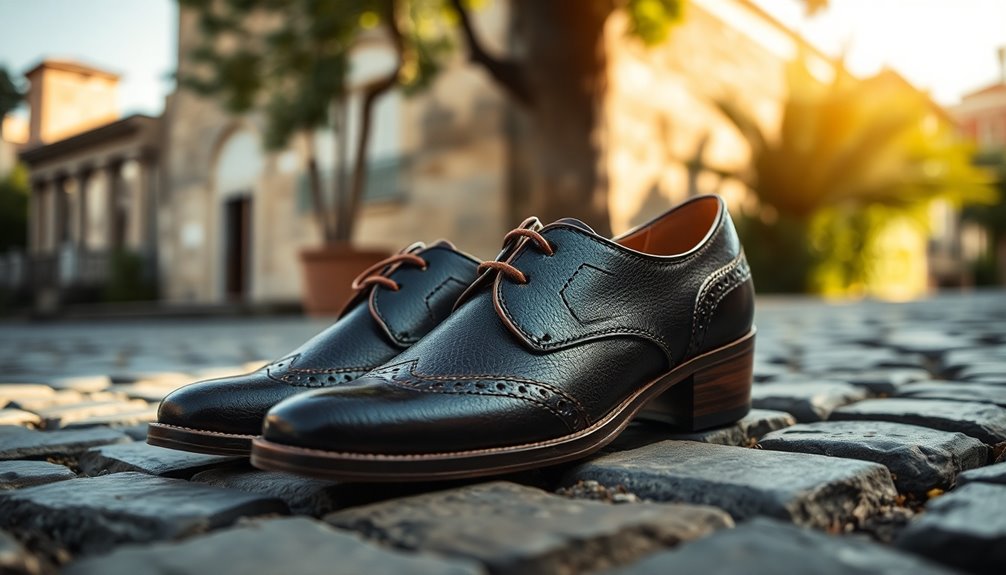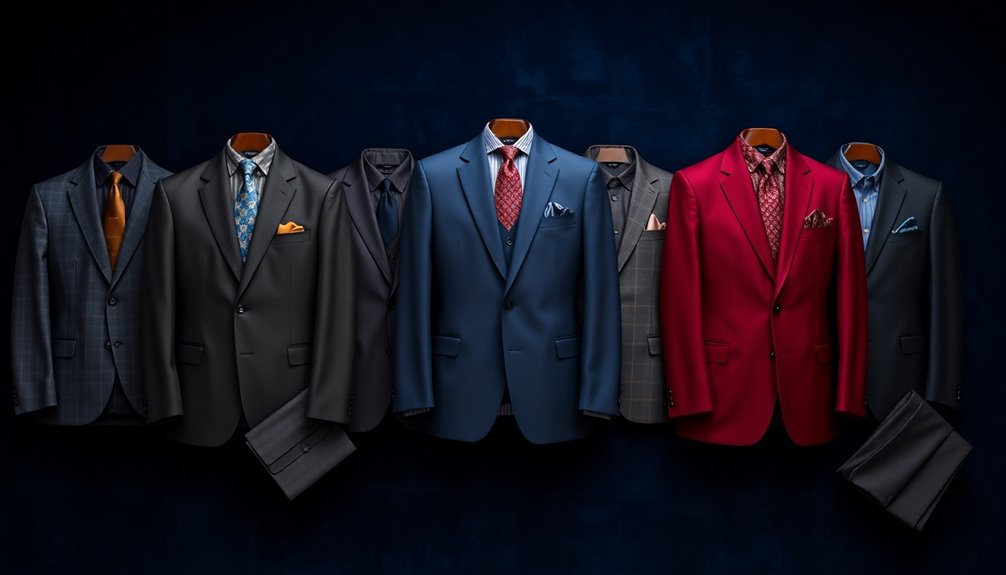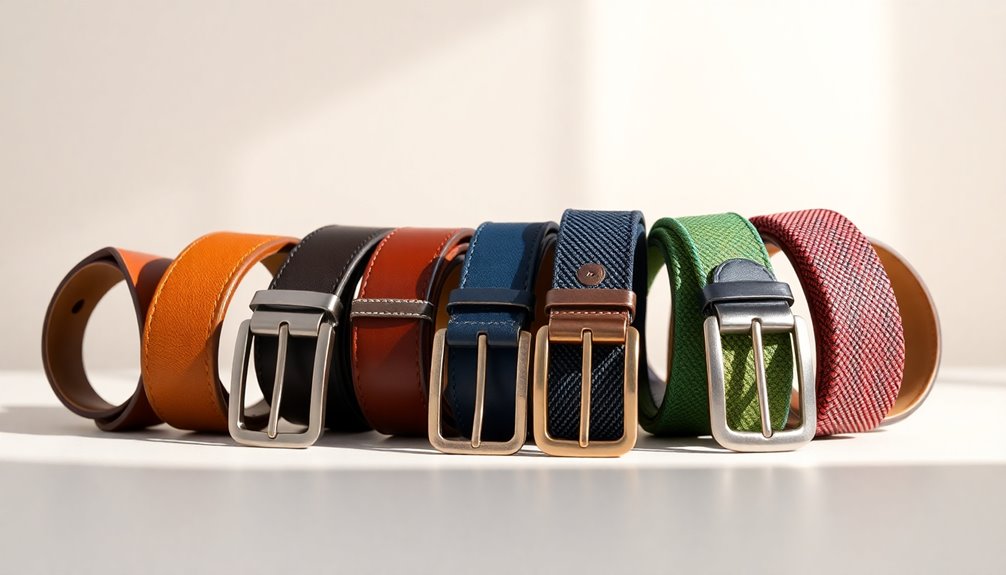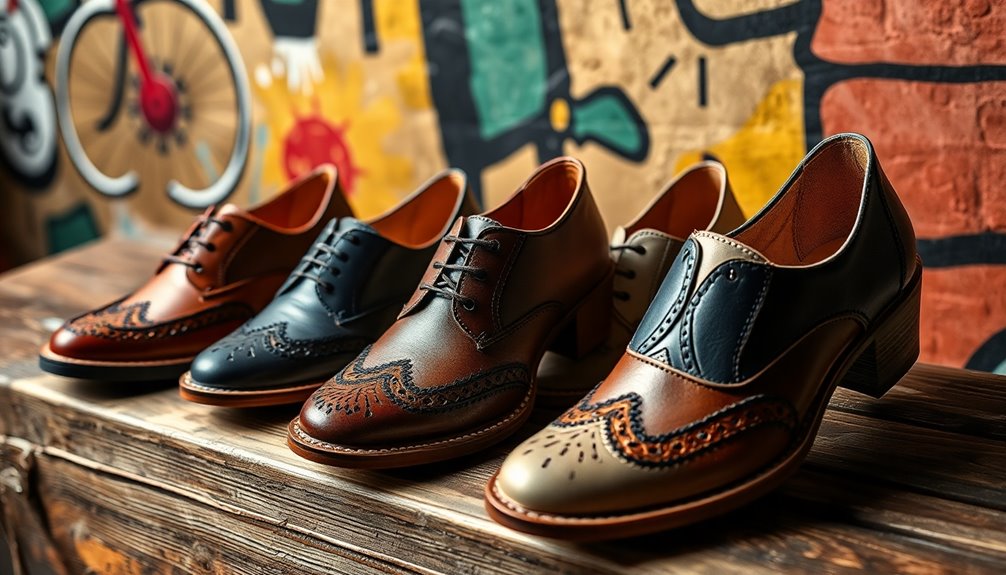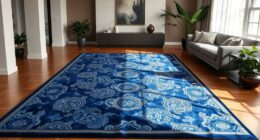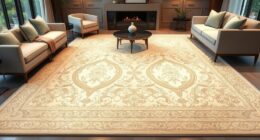When you're exploring Israel's shoe industry, you'll find innovative designs that expertly blend tradition with modern technology. Brands like Ganit Goldstein are using 3D printing alongside artisanal craftsmanship to create unique footwear. Kobi Levi's imaginative styles draw inspiration from nature, showcasing artistic expression in each pair. Eco-friendliness is also a priority, with materials like mushroom mycelium and 3D-printed components leading the charge for sustainability. The cultural significance is deeply rooted in history, reflecting the evolving nature of footwear. By understanding these elements, you can appreciate the richness of Israel's shoe design scene even more.
Key Takeaways
- Israeli designers like Ganit Goldstein merge 3D printing with traditional craftsmanship, creating unique and sustainable footwear that reflects modern aesthetics.
- Kobi Levi's imaginative shoe designs draw inspiration from nature, showcasing the artistic and conceptual side of footwear in Israel.
- Educational institutions such as Bezalel Academy foster innovation by blending traditional techniques with contemporary design concepts, nurturing the next generation of footwear creators.
- Exhibitions like "A Walk Of Art" highlight the dynamic interplay of tradition and modernity, promoting the cultural significance of Israeli footwear designs.
- The rising demand for eco-friendly options in Israel reflects a broader trend towards sustainability, influencing innovative practices among local footwear brands.
Innovative Shoe Designs From Israel
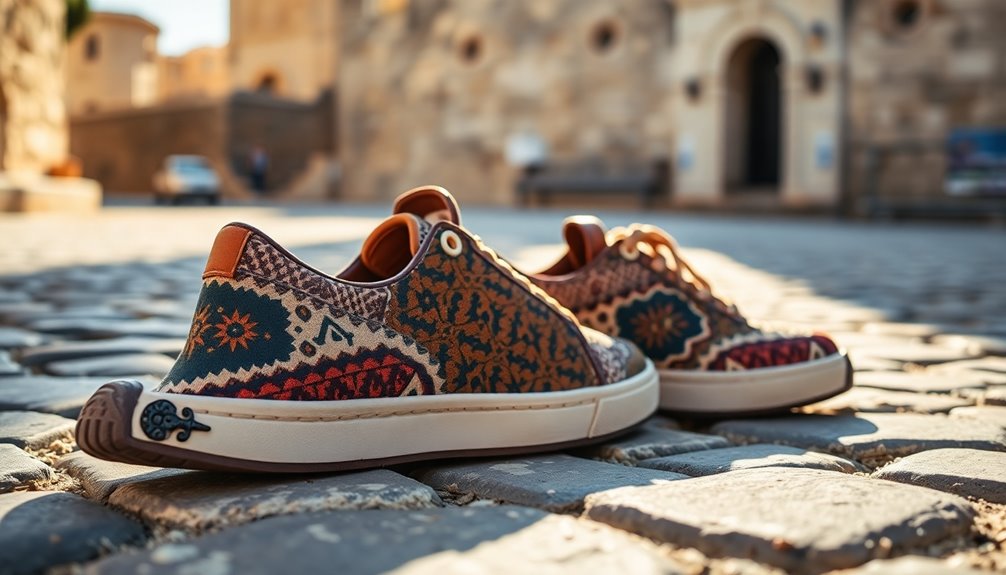
Israel's innovative shoe designs are redefining sustainability and customization in footwear. Companies like Balena are leading the charge with their 3D-printed, fully compostable shoes, made from natural ingredients and a compostable plastic called BioCir.
You'll be impressed to know that these shoes decompose completely within six months when returned to an industrial compost facility. In addition, the use of circular economy principles in the design of these shoes ensures that their lifecycle minimizes waste and promotes environmental responsibility.
Another exciting development is Sneature's use of mushroom mycelium for shoe soles, promoting biodegradability. They also incorporate Chiengora, a unique yarn made from shed dog hair, which enhances sustainability further.
On the customization front, Tidhar Zagagi's Pixel Shoe setup offers a fresh approach. By using adjustable wooden molds and polyurethane foam casting, you can create ergonomic shoes tailored to your fit in mere minutes.
Zagagi even travels with his setup to provide instant customization on the spot, proving that bespoke footwear doesn't have to be expensive.
These innovative designs not only focus on style but also embrace sustainability, making a significant impact in the footwear industry.
If you're looking for shoes that reflect your values, Israel's cutting-edge designs are definitely worth considering.
Artists Shaping Footwear Trends

Artists are revolutionizing footwear trends with their unique designs and creative approaches. Take Kobi Levi, for instance—his imaginative shoes have caught the eyes of celebrities like Lady Gaga and Whoopi Goldberg. Drawing inspiration from animals, nature, and even women's history, he crafts pieces that are both art and footwear, such as a shoe shaped like a coffee cup.
You'll find his limited-series designs available online, priced between $800 to $1,000.
Many of these innovative designers hail from renowned institutions like Bezalel Academy of Arts and Design, where hands-on experience is key. This background allows them to blend traditional techniques with radical concepts, often using unconventional materials like salt crystals and glass. The exhibition "A Walk Of Art" at the Parasol Projects Gallery showcases conceptual footwear, emphasizing the artistic and cultural significance of these unique creations.
Their work doesn't just focus on aesthetics; it represents significant cultural and social statements, particularly regarding women's presence in society. With a consumer-centric approach, these artists create shoes that are comfortable, flattering, and reflective of seasonal trends.
Whether you're in the local market or exploring international options, the unique flair of Israeli footwear designers is sure to inspire your next shoe choice.
The Role of 3D Printing
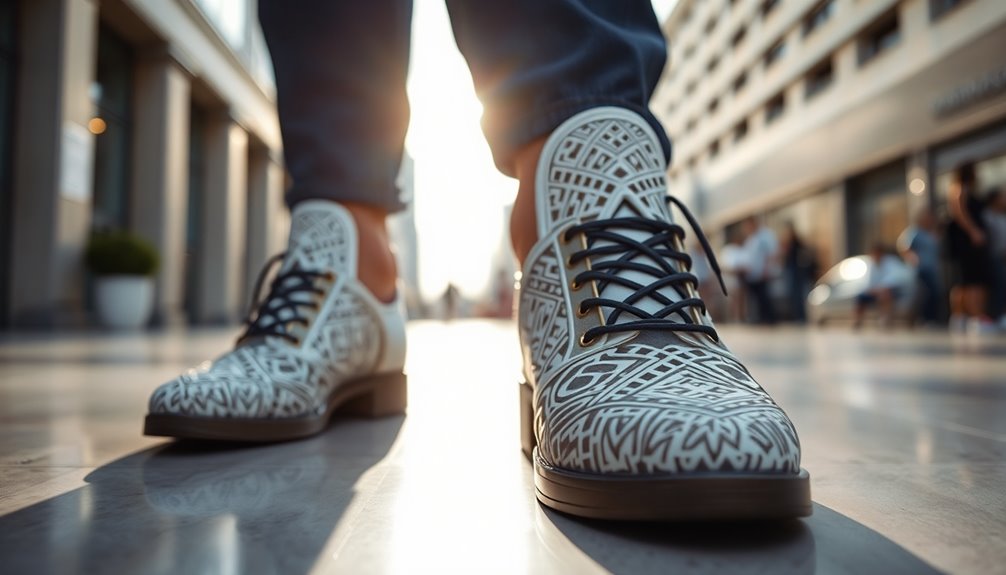
The evolution of footwear design has been significantly impacted by 3D printing, which opens up a world of possibilities for innovation and customization. Astrology claims to influence personality traits and attractiveness, which can also reflect in the way individuals choose and wear their footwear, showcasing their unique style.
You'll find that companies like Adidas and New Balance are leveraging this technology to create shoes tailored specifically to your foot anatomy. With 3D foot scans, you can experience insoles designed just for you, enhancing both comfort and performance. This advancement in footwear technology is a prime example of how AI algorithms are utilized to personalize user experiences.
Moreover, brands like Balena use compostable materials that fully biodegrade in just six months, promoting an eco-friendly approach to shoe production. Their shredding and composting system encourages you to return your shoes for responsible disposal, contributing to a circular economy.
3D printing also enables unique designs, such as Balena's organic root-like slides or Neta Soreq's Energetic Pass collection featuring springy, muscle fiber-inspired platforms. This innovation not only enhances aesthetics but also aligns with the growing interest in alternative assets among consumers who value sustainability.
By integrating traditional craftsmanship with modern techniques, you get footwear that's not only functional but also a piece of art.
Ultimately, 3D printing represents a fusion of technology and creativity, allowing you to embrace both personalized comfort and sustainable practices in your footwear choices.
Cultural Influences on Shoe Design

How do cultural influences shape the designs of shoes you wear today? From the ancient sandals of Egypt to modern sneakers, each design tells a story rooted in history.
Think about the luxurious materials and intricate designs of elite footwear, which historically set them apart from the functional shoes of commoners. Shoes like pointed medieval styles indicated social status, while high heels transformed from masculine equestrian gear to a women's fashion statement. Cultural and societal factors have historically influenced shoe design, showcasing how shoes adapt to the needs and preferences of different groups. For instance, the use of traditional healing techniques in Indigenous cultures often inspires the craftsmanship in their footwear. Additionally, the budgeting process for sourcing quality materials can significantly impact the final design and cost of shoes.
Regional influences also play a significant role. Espadrilles and wooden clogs reflect cultural identities, showcasing craftsmanship unique to their areas.
In more recent times, hip-hop culture has revolutionized sneaker design, turning them into symbols of style and belonging.
You can see the evolution of sneakers from their practical athletic origins in the 1850s to their status as collectible art pieces today.
As you slip on your shoes, consider how each pair is woven with cultural significance—whether it's the spiritual Native American moccasins adorned with tribal symbols or the customizable options that let you express your individuality.
Cultural influences continue to shape not just what you wear, but how you connect with your heritage and community.
Market Trends in Footwear

Driven by evolving consumer preferences and technological advancements, the footwear market is experiencing significant growth and transformation. Valued at $409.5 billion in 2022, it's expected to reach $725.1 billion by 2032, showcasing a projected CAGR of 5.9% from 2023 to 2032.
In 2022 alone, footwear consumption hit 20.6 billion pairs, representing an 8.42% increase from the previous year.
You'll notice a rising demand for fashionable, comfortable footwear across all age groups, with health and fitness awareness fueling interest in sports shoes for activities like Zumba and Yoga. The athleisure trend merges comfort with style, turning functional sportswear into fashion statements. Consumers increasingly prioritize eco-friendly options, pushing brands to innovate sustainably. Approximately 87.4% of global footwear production occurs in Asia is a key factor contributing to the competitive landscape of the market.
Regionally, the Asia Pacific dominates the market, while Europe is set to become the fastest-growing area. Emerging markets in Asia, Latin America, and the Middle East drive demand due to rising disposable incomes.
Technological advancements like 3D printing are enhancing customization, and the retail landscape is thriving with online shopping platforms, making diverse shoe options more accessible than ever.
Traditional Crafts Meet Technology
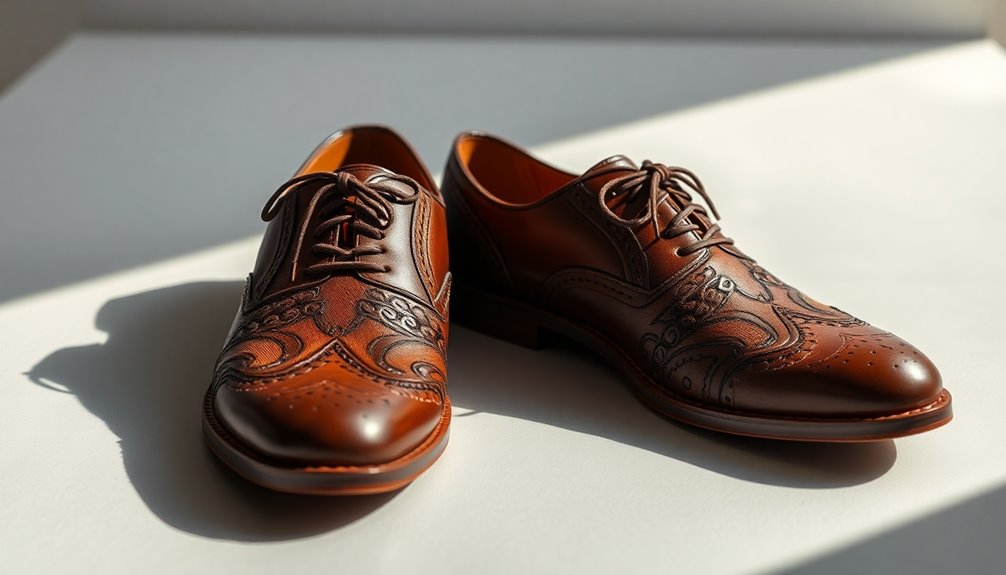
Traditional craftsmanship and modern technology are merging in exciting ways within the footwear industry, especially in Israel.
You'll find that traditional materials like natural cork and latex are at the forefront of innovative shoe designs. Cork, sourced from oak trees, forms comfortable soles, while natural latex, derived from wood rubber, adds to the overall coziness. Leather remains a staple, skillfully integrated into both traditional and contemporary designs, often combined with cork and rubber to create flexible soles.
Young designers from Jerusalem's Bezalel Academy and Tel Aviv's Shenkar College are bringing fresh, modern perspectives to these age-old techniques.
For instance, Ganit Goldstein utilizes 3D printing alongside handmade methods, allowing for unique creations that maintain a connection to tradition. Digital software aids in crafting shoe skeletons, while materials like thermoplastic polyurethane enhance durability.
Under the guidance of Ami Bar-Nahor, traditional work boots have transformed into fashionable, health-conscious footwear, reflecting the company's shift towards stylish, colorful footwear.
You'll see a careful balance of modern manufacturing processes and detailed, artisanal craftsmanship, ensuring shoes that are as comfortable as they're stylish. This blend of art and technology not only innovates design but also preserves the rich cultural narratives of Israeli footwear.
Notable Exhibitions and Showcases
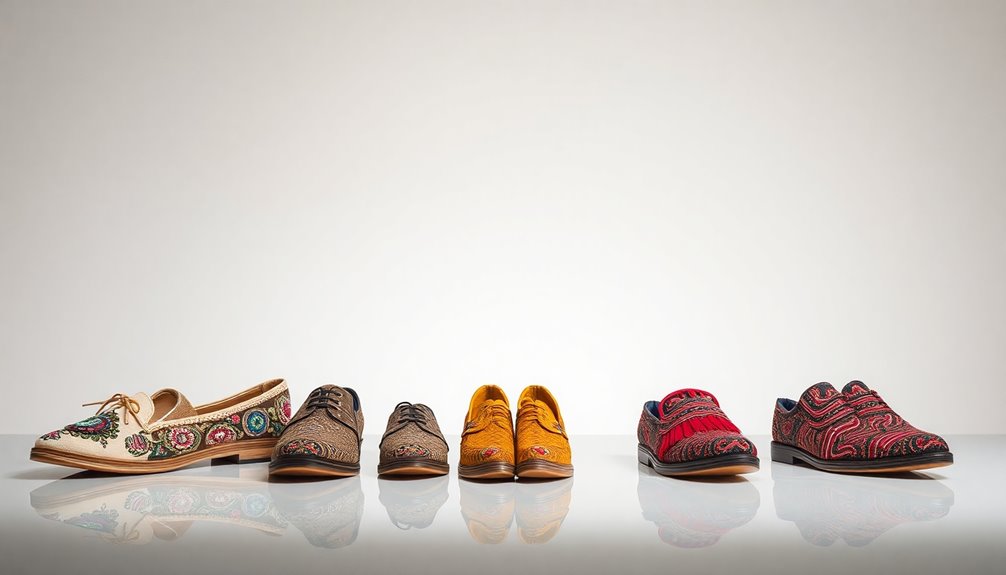
Innovation thrives in the vibrant atmosphere of Israel's footwear scene, showcased through a series of notable exhibitions and showcases. One of the standout events is the Shoofuni Shoe Fair, held bi-annually in Tel Aviv at Expo Tel Aviv. This fair presents Israel's leading shoe and bag designers, offering a unique opportunity for enthusiasts to snag 20% off new collections. The fair also marks the first time apparel is included, celebrating Israeli fashion design in a more comprehensive manner.
Another significant exhibition is "In Her Shoes," located at the Rishon Lezion Museum. It commemorates 100 years of women's equal rights in Rishon LeZion, featuring thought-provoking designs by Israeli artists like Kobi Levi that reflect women's struggles for equality.
You might also explore "Walk Of Art: Visionary Shoes," exhibited at Parasol Projects Gallery in New York City. This exhibition showcases over 60 shoes created by Bezalel Academy alumni and students, including unique pieces by Kobi Levi, highlighting the artistic significance of footwear.
Lastly, don't miss the OUTSTANDING Exhibition at the Bezalel Academy of Arts and Design in Jerusalem, featuring innovative student designs from the past six years. These showcases reveal the dynamic fusion of tradition and modernity in Israel's footwear design landscape.
Educational Institutions in Design

As you explore the world of footwear design, you'll find that educational institutions in Israel play a crucial role in shaping the next generation of designers. These programs offer a blend of theory and practical skills essential for success in the industry.
For example, Pratt Institute's FASD-364 course covers everything from patternmaking to construction techniques, while Lasell University's 13-week certificate focuses on shoe design basics and trend analysis. Additionally, students enrolled in courses like this one gain hands-on experience by completing two stitched shoe uppers, which reinforces their learning.
At renowned schools like Parsons, shoe design is integrated into broader fashion programs, enhancing your creative vision. You'll engage in hands-on projects, crafting stitched shoe uppers and completing pump and oxford shoes, which reinforces your learning.
Courses delve into biomechanics, material selection, and design processes, ensuring you grasp fit, function, and sustainability. You'll also create digital footwear collections critiqued by industry professionals, which helps build your portfolio.
With experienced faculty and access to advanced tools and fabrication labs, these institutions provide a rich educational environment. The emphasis on collaboration and critical thinking prepares you for real-world challenges in the footwear industry, enhancing your career prospects significantly.
Global Recognition of Designers

Many designers from Israel are gaining global recognition for their unique approaches and talents in the footwear industry. A prime example is Ganit Goldstein, whose innovative designs have captured international attention. In 2018, she participated in the Redress Design Awards in Hong Kong, placing second with her sustainable collections made from old fabrics. She also stood out as the only Israeli designer in the Arts of Fashion competition in San Francisco, where her work was showcased alongside global talent.
Goldstein's 3D-printed clothing and shoes, part of her "Between the Layers" collection, have been displayed worldwide, including at prestigious venues like the Design Museum in Holon and the International Trade Fair for the Skilled Trades in Munich. Her efforts to blend modern technologies with traditional craftsmanship have garnered acclaim, particularly with her collaboration with Stratasys for 3D printing. This integration of modern technologies showcases the innovative spirit prevalent among many Israeli designers, reflecting the same dedication to color accuracy found in high-quality home cinema projectors. Additionally, her use of herbal alternatives in materials promotes sustainable practices that resonate with eco-conscious consumers. Furthermore, like many apiculturists in the beekeeping community, she emphasizes the importance of sustainability in her production methods. Goldstein's commitment to eco-friendly practices mirrors the principles of eco-friendly materials, ensuring her creations are both stylish and sustainable.
Similarly, Kobi Levi's eccentric footwear designs have reached a broad audience, thanks to features in Lady Gaga's "Born this Way" music video and coverage in popular media outlets.
Both designers exemplify the innovative spirit of Israeli footwear, pushing boundaries and earning their place on the global stage.
Future of Israeli Footwear Industry
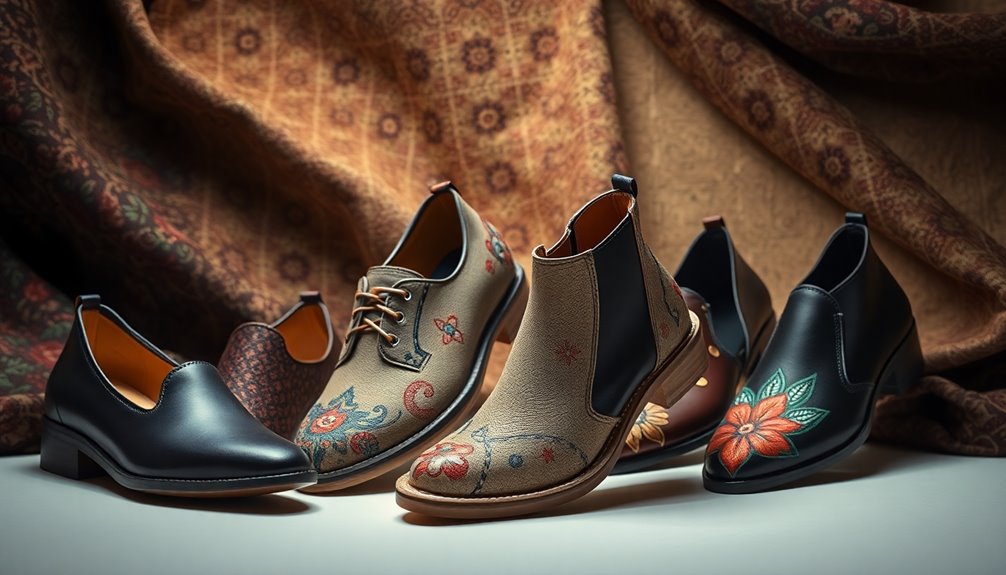
The future of the Israeli footwear industry looks promising as it adapts to emerging market trends and consumer demands. Health and wellness trends are driving a surge in demand for sports footwear, while the rise of eCommerce is transforming how you shop. By 2024, the Israeli footwear eCommerce market is expected to reach $448 million, with a 1.7% compound annual growth rate projected through 2028. However, economic challenges like inflation and interest rate hikes may limit growth in 2024. You'll notice that prices for apparel and footwear are expected to decrease in constant terms, despite manufacturers facing rising costs. The competitive landscape is intensifying, with international players entering the market, making it essential for local brands to innovate continually. Additionally, the increased brand entries in the market suggest that established brands will face significant challenges ahead. Sustainability is also on the rise, with brands focusing on eco-friendly products and advanced materials that enhance comfort and durability. Digital innovations, such as personalized recommendations and virtual fitting solutions, will further improve your shopping experience. As the industry navigates these complexities, a commitment to quality craftsmanship and customer-centric approaches will be vital for maintaining a competitive edge.
Frequently Asked Questions
How Can I Purchase These Innovative Shoe Designs?
To purchase these innovative shoe designs, start by exploring online platforms like official brand websites and Etsy for unique offerings.
Check out physical stores in your area or visit designer studios in Tel Aviv for direct purchases.
Don't forget to look for local boutiques and specialty stores that carry these brands.
If you're interested in custom options, reach out to designers for bespoke services or workshops tailored to your preferences.
Are There Sustainable Materials Used in These Shoes?
Yes, you'll find various sustainable materials used in these shoes.
Brands utilize BioCir elastomer, which is 100% compostable and made from natural materials. Cork is another popular option, offering renewability and durability.
Additionally, some shoes incorporate recycled car tires, reducing waste. Naot emphasizes ethical production with high-quality leather and natural insoles.
What Is the Price Range for These Unique Footwear Designs?
The price range for unique footwear designs varies significantly based on the style and brand.
For example, you'll find Naot shoes priced between $169.95 and $239.95, while VEJA V-10 shoes can be on sale for $138.60.
Specialty and safety shoes often range from $9.50 to $17.40, depending on the type and order quantity.
Fashion items might start around $24.55 and go up, depending on the design and materials used.
Can I Customize My Own Shoe Design?
Yes, you can absolutely customize your own shoe design!
Start by selecting from over 50 shoe styles. Then, use the design tool to pick base colors and add your unique logos or images.
You'll see real-time previews, allowing you to adjust everything until it's perfect. Once you're satisfied, submit your design for production, and enjoy your custom creation delivered right to your door within days!
Where Can I See More of Ganit Goldstein's Work?
You can see more of Ganit Goldstein's work by visiting her portfolio online, where she showcases her innovative designs and exhibitions.
Check out platforms like 3DPrint.com and ISRAEL21c for articles and updates. YouTube also features videos of her presentations and design processes.
If you're interested in a deeper dive, attend exhibitions at design museums or universities where her collections are frequently displayed.
Following her on social media can keep you updated, too!
Conclusion
Israel's footwear scene is a vibrant mix of tradition and modern innovation, showcasing unique designs that captivate the global market. You've seen how artists and cutting-edge technology, like 3D printing, shape these trends, while cultural influences breathe life into every pair. As you explore notable exhibitions and the educational institutions nurturing talent, it's clear that the future of Israeli footwear is bright. Embrace these innovative designs that promise to redefine comfort and style in your wardrobe.
